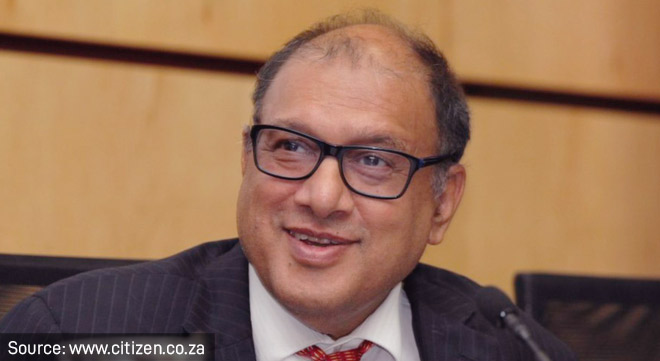Co-ordination and collaboration among state agencies involved in combating financial crimes has improved significantly, but much must still be done for South Africa to produce tangible evidence to the Financial Action Task Force (FATF) that it is combating money laundering and terrorist financing.
This is the take-away message from an interview with National Treasury deputy director-general Ismail Momoniat (pictured) published in Business Times yesterday.
When the FATF grey-listed South Africa in February 2023, a jointly agreed Action Plan was adopted listing 22 action items linked to the strategic deficiencies identified in the country’s anti-money laundering and counter-terrorism financing regime.
South Africa must address all 22 items to get off the grey list. The deadlines for addressing the action items are between January 2024 and January 2025.
At its Plenary last the month, the FATF said South Africa has addressed or largely addressed 5 of the 22 action items, while 14 items have been partly addressed.
If South Africa is assessed as having largely addressed all the action items in February 2025, the FATF will schedule an on-site visit in April or May 2025, to confirm that assessment and make a recommendation to the FATF Plenary in June 2025.
Read: Treasury: tough challenge to tick off all the items on FATF’s Action Plan
In the Business Times article, Momoniat expresses cautious optimism about South Africa’s chances of getting off the grey list next year. “It’s going to be extremely tough, but it’s doable,” he is quoted as saying.
“Among the biggest challenges is for us to demonstrate a sustained increase in investigations and prosecutions for serious and complex money laundering, in particular involving professional money-laundering networks and third-party money laundering,” he says.
According to the article, the challenges in meeting the FATF’s requirements include:
- The South African Police Service (SAPS) is required to demonstrate a sustained increase in proactive requests for information from the Financial Intelligence Centre (FIC). This indicates a need for more proactive engagement by the SAPS in accessing relevant financial intelligence to combat money laundering and terrorist financing.
- Although both the SAPS and the National Prosecuting Authority (NPA) have access to information from the FIC, there’s a need for improvement in how this information is used to secure convictions. The effectiveness of investigations and prosecutions needs to be enhanced to demonstrate tangible progress in addressing financial crimes.
- The NPA needs to demonstrate a sustained increase in requesting information outside South Africa through Mutual Legal Assistance Requests (MLARs), to prosecute complex and serious money laundering cases. Momoniat says there has been “a significant improvement” in MLARs.
- The delay or lack of successful prosecutions, particularly in notable cases such as those involving the Guptas. There’s a need for expedited progress in handling complex and serious money-laundering cases to demonstrate the effective enforcement of financial crime laws.
According to Business Times, the fact that no one named in the Zondo report into state capture has been successfully prosecuted is a big concern for Momoniat.
“The worry with SAPS and the NPA is: do they have enough capable people? If not, is it because they’re being undermined or lack skills? That’s something only the NPA can answer. But to those of us on the outside, it’s clear there need to be more prosecutions, otherwise we’re not going to get out of grey-listing. But it’s not only the police and NPA; there are lots of agencies that have to do more, quicker,” he is quoted as saying.
Click here to read the full Business Times report (subscription required).
Ideological resistance or insufficient will?
Countering terrorism financing remains one of South Africa’s key deficiencies identified by the FATF, according to an article published by the Institute for Security Studies (ISS) this month.
“South Africa’s struggle to get off the grey list could partly be attributed to the government’s ideological resistance to acting against terrorism on its own soil – which some officials see as a Western obsession not justified by any real threat,” the article in ISS Today said.
It quoted Democratic Alliance MP Dion George as saying that South Africa’s financial regulations were largely in place, and the problem lay more on the judicial side.
“South Africa is considered a conduit for illicit funds … a route for terrorist financing … but there’s no political will to interdict anybody who is behaving inappropriately,” he said.
But Peter Attard Montalto, an economic analyst at Krutham, said he did not think ideological resistance was a significant factor in getting South Africa delisted. The essential problem was that ‘South Africa has not had a proper top-down all-in push to get off the list. National Treasury has done its best, but more leadership is needed. This should have been driven by the president personally and his office, as happened in other countries,” ISS Today quoted him as saying.
“Montalto said Treasury and the South African Reserve Bank, which were ostensibly in charge of getting the country off the list, didn’t have the power to ensure other departments complied, so it was unlikely South Africa would be delisted in February 2025,” the article said.



